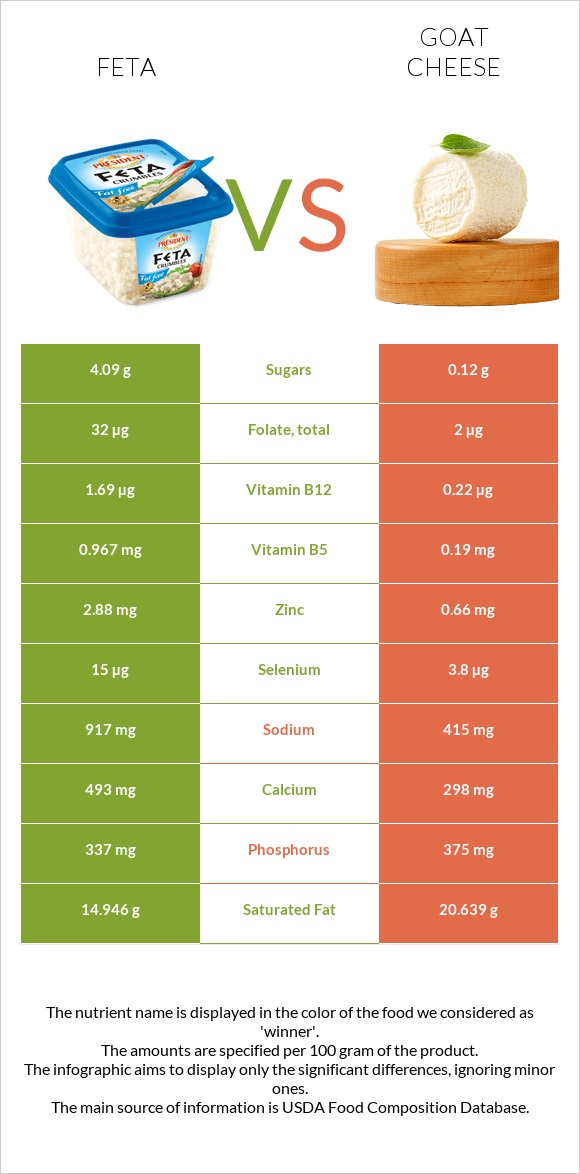Feta vs. Goat cheese — In-Depth Nutrition Comparison
Compare
Infographic

Infographic link
Mineral Comparison
Mineral comparison score is based on the number of minerals by which one or the other food is richer. The "coverage" charts below show how much of the daily needs can be covered by 300 grams of the food.
| Contains more CalciumCalcium | +65.4% |
| Contains more ZincZinc | +336.4% |
| Contains more SeleniumSelenium | +294.7% |
| Contains more MagnesiumMagnesium | +52.6% |
| Contains more PotassiumPotassium | +154.8% |
| Contains more IronIron | +149.2% |
| Contains more CopperCopper | +1662.5% |
| Contains more PhosphorusPhosphorus | +11.3% |
| Contains less SodiumSodium | -54.7% |
| Contains more ManganeseManganese | +232.1% |
Vitamin Comparison
Vitamin comparison score is based on the number of vitamins by which one or the other food is richer. The "coverage" charts below show how much of the daily needs can be covered by 300 grams of the food.
| Contains more Vitamin B1Vitamin B1 | +113.9% |
| Contains more Vitamin B2Vitamin B2 | +24.9% |
| Contains more Vitamin B5Vitamin B5 | +408.9% |
| Contains more Vitamin B6Vitamin B6 | +606.7% |
| Contains more Vitamin B12Vitamin B12 | +668.2% |
| Contains more FolateFolate | +1500% |
| Contains more Vitamin AVitamin A | +225.6% |
| Contains more Vitamin EVitamin E | +44.4% |
| Contains more Vitamin DVitamin D | +25% |
| Contains more Vitamin B3Vitamin B3 | +15.8% |
| Contains more Vitamin KVitamin K | +38.9% |
All nutrients comparison - raw data values
| Nutrient |  |
 |
DV% diff. |
| Vitamin B12 | 1.69µg | 0.22µg | 61% |
| Copper | 0.032mg | 0.564mg | 59% |
| Vitamin A | 125µg | 407µg | 31% |
| Vitamin B6 | 0.424mg | 0.06mg | 28% |
| Saturated fat | 14.946g | 20.639g | 26% |
| Sodium | 917mg | 415mg | 22% |
| Calcium | 493mg | 298mg | 20% |
| Zinc | 2.88mg | 0.66mg | 20% |
| Selenium | 15µg | 3.8µg | 20% |
| Vitamin B5 | 0.967mg | 0.19mg | 16% |
| Protein | 14.21g | 21.58g | 15% |
| Fats | 21.28g | 29.84g | 13% |
| Vitamin B2 | 0.844mg | 0.676mg | 13% |
| Iron | 0.65mg | 1.62mg | 12% |
| Folate | 32µg | 2µg | 8% |
| Vitamin B1 | 0.154mg | 0.072mg | 7% |
| Calories | 264kcal | 364kcal | 5% |
| Phosphorus | 337mg | 375mg | 5% |
| Monounsaturated fat | 4.623g | 6.808g | 5% |
| Cholesterol | 89mg | 79mg | 3% |
| Potassium | 62mg | 158mg | 3% |
| Manganese | 0.028mg | 0.093mg | 3% |
| Magnesium | 19mg | 29mg | 2% |
| Carbs | 4.09g | 0.12g | 1% |
| Vitamin D | 16 IU | 22 IU | 1% |
| Vitamin E | 0.18mg | 0.26mg | 1% |
| Vitamin D | 0.4µg | 0.5µg | 1% |
| Vitamin B3 | 0.991mg | 1.148mg | 1% |
| Vitamin K | 1.8µg | 2.5µg | 1% |
| Polyunsaturated fat | 0.591g | 0.709g | 1% |
| Net carbs | 4.09g | 0.12g | N/A |
| Sugar | 4.09g | 0.12g | N/A |
| Choline | 15.4mg | 15.4mg | 0% |
| Tryptophan | 0.2mg | 0.227mg | 0% |
| Threonine | 0.637mg | 0.805mg | 0% |
| Isoleucine | 0.803mg | 0.893mg | 0% |
| Leucine | 1.395mg | 1.861mg | 0% |
| Lysine | 1.219mg | 1.549mg | 0% |
| Methionine | 0.368mg | 0.575mg | 0% |
| Phenylalanine | 0.675mg | 0.859mg | 0% |
| Valine | 1.065mg | 1.485mg | 0% |
| Histidine | 0.397mg | 0.589mg | 0% |
Macronutrient Comparison
Macronutrient breakdown side-by-side comparison
Protein:
14.21 g
Fats:
21.28 g
Carbs:
4.09 g
Water:
55.22 g
Other:
5.2 g
Protein:
21.58 g
Fats:
29.84 g
Carbs:
0.12 g
Water:
45.52 g
Other:
2.94 g
| Contains more CarbsCarbs | +3308.3% |
| Contains more WaterWater | +21.3% |
| Contains more OtherOther | +76.9% |
| Contains more ProteinProtein | +51.9% |
| Contains more FatsFats | +40.2% |
Fat Type Comparison
Fat type breakdown side-by-side comparison
Saturated fat:
Sat. Fat
14.946 g
Monounsaturated fat:
Mono. Fat
4.623 g
Polyunsaturated fat:
Poly. Fat
0.591 g
Saturated fat:
Sat. Fat
20.639 g
Monounsaturated fat:
Mono. Fat
6.808 g
Polyunsaturated fat:
Poly. Fat
0.709 g
| Contains less Sat. FatSaturated fat | -27.6% |
| Contains more Mono. FatMonounsaturated fat | +47.3% |
| Contains more Poly. FatPolyunsaturated fat | +20% |





